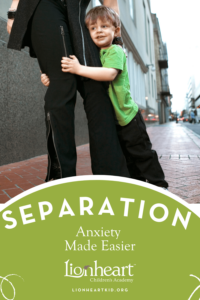How Parents Can Help With Their Child’s Separation Anxiety
Lionheart Children’s Academy Has Tips for Separation Anxiety
As a parent, it is always an unsettling experience to witness your child experience any kind of distress. If you have noticed that your child has a difficult time leaving your side, they may be struggling with separation anxiety. Any level of separation anxiety can be challenging for both children and parents alike. It is important to remember that your child is experiencing a very normal stage of development. Whether you are struggling to drop your child off for daycare, leave for work in the morning, or even simply leave the room, the Lionheart Children’s Academy team is here to help. We are happy to provide some of our most trusted tips and tricks to help your little one navigate their fears and feel safe in new situations. Read on to learn more about dealing with
What is Separation Anxiety?
Separation anxiety occurs when children are separated from their primary caregivers. This most commonly occurs with parents or grandparents. It is most commonly seen in children between the ages of six months and three years but can occur in all stages of life. Symptoms are also possible in varying degrees of severity. Some parents may notice challenges in very specific situations, while others may not be able to walk into a different room of the house without inducing an emotional response. No matter what your child’s anxiety looks like, relief is possible. It is important to know the signs to look out for so that you can properly help them through this tough time. If your child has experienced any of the following, they may be dealing with separation anxiety:
- Clinging to parents in new situations
- Poor performance at school or daycare
- Severe crying or inability to regulate emotions
- Refusal to go to school or daycare
- Refusal to interact with teachers or other children
- Headaches
- Nausea or vomiting
- Nightmares or difficulty sleeping
- Refusal to sleep alone
How Does Separation Anxiety Develop?
Children of any age can experience separation anxiety. Having a child who struggles with separation anxiety does not signify that you have made a mistake in your parenting tactics. It is more likely a sign that you have created a meaningful, secure relationship with your little one. It is important to remember that their behavior is completely normal and often not a direct result of any of your actions.
What Triggers Separation Anxiety?
Every child’s experience with separation anxiety is unique. Your child’s symptoms may look very different from those of other children, which is completely okay. Some children may also be more prone to developing separation anxiety than others from the start. Separation anxiety may be triggered by any major life event that results in separation of some kind. This may include the following events, among many others:
- Moving to a new home
- Switching schools
- Divorce between parents
- Prolonged stay in the hospital
- Death of a loved one
- Death of a pet
How Can I Help My Child Deal With Separation Anxiety?
Watching your child become increasingly upset when you leave is undoubtedly a challenging experience on your end, as well. However, you should not feel guilty or responsible for your child’s distress when leaving them under a responsible party’s supervision. Overcoming this difficult period will be a big step in their journey toward becoming more independent. Though you may not be able to pinpoint why this is occurring from the start, the fear they are experiencing is genuine in your child’s mind. Make sure to always approach the situation gently and with compassion. Consider using the following strategies to help your child navigate their separation anxiety:
- Build a Routine: A fun, engaging ritual that you and your child can repeat each time you leave is a great way to ease the tension during the transition. Whether you use a cute, memorable phrase, create a special handshake, or bring in a comfort object such as a soft blanket or toy, a routine will help your child build the connection between “goodbye” and safety.
- Make it Short and Sweet: We understand that the process of leaving may be difficult for both you and your child. However, we recommend making the transition as short and simple as possible. The longer you linger, the more anxiety will build. “Ripping off the bandage” will be difficult in the moment but worthwhile in the long run. Smile, tell them that you will see them soon, and send them on their way. You’ll be together again in no time!
- Keep Your Promises: Giving your child something to look forward to when you return is a great option to help ease their anxiety. This could include something like a trip to the playground, a visit to grandma’s house, 30 minutes of their favorite TV show, or an exciting snack. Whatever you choose to leave them with, make sure to keep your promise when it is all said and done. If they return home from and do not receive their promised treat, it will be even more difficult to build their sense of trust and confidence.
- Maintain Consistency: Once you have established a drop-off ritual that your child seems to connect with, stick with it. By introducing the same elements at the same time every day, they can begin to build their sense of trust both in you and in their new environment.
- Practice Makes Perfect: If you are anticipating a significant change that your child may struggle with, we encourage you to help them practice with smaller goodbyes. Maybe you have a few quick errands to run this afternoon. This could be a great opportunity to leave your child with a trusted friend, relative, or neighbor for a few minutes to practice being apart. You could also schedule playdates or use weekend trips to grandma’s house as a chance to help them prepare and have fun during your absence.
Discuss Your Child’s Unique Needs With Your Pediatrician
If you have tried different support methods and nothing seems to bring comfort to your child, help is available. Separation anxiety is completely normal, and there is no shame in seeking assistance. We recommend discussing your concerns with your child’s pediatrician to determine the best path forward for your child. Your pediatrician will be able to ease your worries by assessing your unique situation from a professional standpoint. They can help you build an effective plan of action by connecting you with additional resources, which may include:
- Therapy: Cognitive Behavioral Therapy is a popular method of therapy that can be used for many situations. Children who struggle with spending time away from their parents can benefit from this professional, supportive environment. This gives your child a safe space to voice their fears and receive professional, constructive feedback from their therapist.
- Medication: Though it may not be the best option for every child, medication can be a life-changing tool for children who experience anxiety. There should be no shame in anxiety medication, as it can help many children navigate life in a more productive manner. Always consult your child’s pediatrician or psychiatrist for more information. They can help you figure out the healthiest treatment method for your child’s needs.
Contact Us for More Information About Separation Anxiety
If your child is dealing with separation anxiety, it is essential to remember that you are not alone. Millions of families worldwide deal with this issue, and support is available. By connecting with helpful resources and discussing your child’s needs with a professional, you can help your child live a more enjoyable, carefree life when you are not around. If you would like more information on the topic or are interested in finding additional support, don’t hesitate to reach out to Lionheart Children’s Academy today. Our team of professionals would be happy to help you navigate this stage of life with your child.


